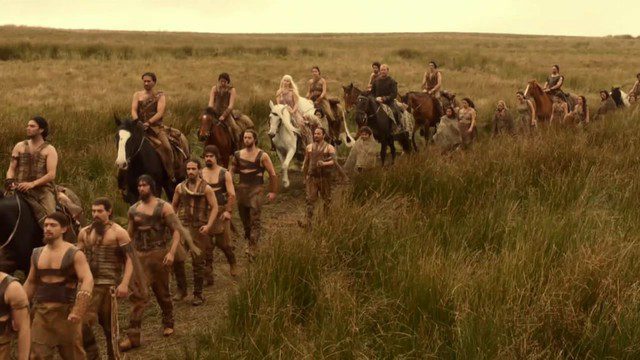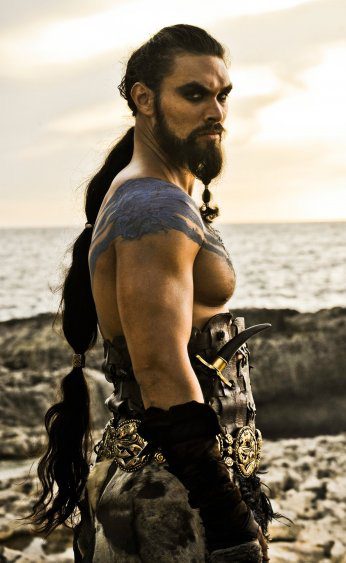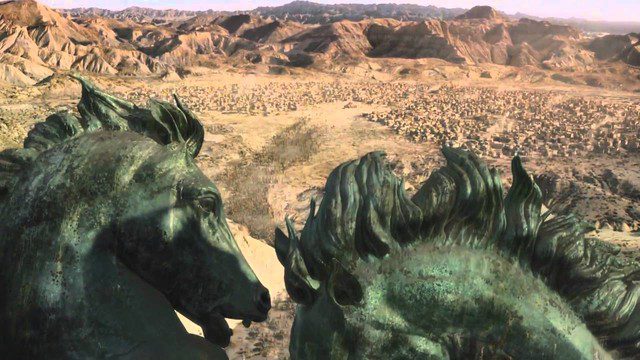Dothraki is a warrior culture originating from Essos, located to the east of Westeros, across the Narrow Sea. They inhabit a vast grassland region in central Essos, known as the Dothraki Sea. The Dothraki warriors are often referred to as “horse lords” or “bloodriders” due to the deep bond they share with their horses. This culture has a close relationship with horses, to the extent that it is said that a Dothraki is born, fights, and dies on horseback. In this segment of the “Complete History of Game of Thrones,” we will explore the lifestyle and customs of this unique culture:
Society
The Dothraki people dominate the expansive grasslands of central Essos, often raiding and conquering other cultures to expand their territory and resources. Their primary mode of transportation is horseback, which is a vital part of their identity—the very name “Dothraki” literally means “those who ride horses.” Young Dothraki children begin riding at a mere age of four, and even the leaders of their clans are expected to ride by the age of six or seven.
The Dothraki culture is divided into various clans known as khalasars, led by a chieftain called a khal. These khalasars roam the Dothraki Sea, constantly moving to find new grazing grounds and resources. They are known for their aggressive raids on neighboring territories, such as Lhazar to the southeast and the Free Cities to the west. Dothraki people sustain themselves by taking what they need, including food, livestock, and any valuables that may serve them. To be respected within their culture, one must be strong and capable of defending their tribe, and they often disdain anything that they perceive as weak. The Dothraki typically show little interest in organized military formations (aside from the elite Unsullied soldiers).
The traditional weaponry of the Dothraki consists of curved swords, spears, and various types of bows, all designed for mobility and effectiveness in combat. Armor is often considered unnecessary since the Dothraki prioritize speed and freedom of movement above all else in battle. Dothraki warriors often grow their hair long and style it into braids, which are cut only in mourning, making their hair an important symbol of their identity and strength. Thus, the most formidable Dothraki warriors are those with long hair, like Khal Drogo, whose hair reaches down to his waist, symbolizing his prowess in battle.
Similar to many nomadic cultures, the Dothraki have a profound respect for their horses and see them as vital to their existence. However, they are less effective when dismounted; on the ground, Dothraki warriors can be at a disadvantage compared to heavily armored infantry. Rarely do they dismount to engage in battle unless it’s a hand-to-hand combat situation, which helps maintain their identity in warfare.
The only Dothraki city is Vaes Dothrak, located in the far northeast of the Dothraki Sea, governed by the Dosh Khaleen, a council of aged priestesses who were once wives of the Khal. The entire community operates on trade and commerce among the Dothraki (as well as with other inhabitants of Essos), and sacred rituals are also conducted at this location. Any instance of bloodshed or violence within Vaes Dothrak is strictly forbidden, though there are exceptions surrounding this law. For instance, if a significant conflict arises, the people may “go out” to engage in battle outside of the city.
The Dothraki are known to have a strong aversion to saltwater, as their horses cannot drink it. In their language, the term for “water” translates to “sweet water.” They are also said to have never sailed across the Narrow Sea to invade Westeros. Thus, the people of Westeros do not often regard the Dothraki as a significant threat, assuming that they would never venture across the Narrow Sea to invade their lands. However, as we have seen in the series, Drogo was once poised to lead an invasion of the Kingdom of Westeros after a brief skirmish involving the assassination plot against Daenerys. But those remaining in Daenerys’s khalasar (about 100 Dothraki) also followed their khaleesi through the Red Waste to Astapor, many of whom fell ill due to the unfamiliar terrain.
Economy
The Dothraki are often described as “non-believers in currency,” instead relying on barter for their needs. Their primary resources in the Dothraki Sea are green grasses and their horses. Since the Dothraki do not farm, their main diet consists of horse meat and fermented mare’s milk.
However, valuable resources and goods are obtained through raiding neighboring nations such as the Free Cities, Slaver’s Bay, or Lhazar, and they may even acquire “secondhand” goods from other Dothraki clans. The Dothraki do not engage in trade or economic activities that would involve currency, but they do highly value the offerings they receive from other cultures. From afar, the inhabitants of the Free Cities have been known to generously provide the Dothraki with gold, goods, and even horses to avoid conflict, as they view their presence as a potential threat.
Despite this, the Dothraki still face challenges in acquiring goods and resources from the Free Cities or Slaver’s Bay through direct trade. In this regard, they may “barter” by offering goods that they have acquired from the Free Cities or Slaver’s Bay.
Religion
Given the significant role of horses in their culture, it is no surprise that the Dothraki worship a deity known as the Great Stallion. The Dosh Khaleen serves as the governing body of the Dothraki. Their religion is intertwined with the practice of “blood magic,” which the Dothraki often view with suspicion and disdain.
Language
The Dothraki have their own distinct language, which is entirely different from the Common Tongue spoken in Westeros. In their language, there are no words for “thank you,” reflecting their cultural values.
Some important terms in the Dothraki language include:
- Dosh khaleen – the council of elder women. They are the former wives of past khals, governing the Dothraki city of Vaes Dothrak. They are the most knowledgeable and often serve as spiritual leaders.
- Dothraki – literally means “horse riders.” A singular horse rider is called a Dothraki, while the plural form is Dothraki.
- Khal – the leader of a Dothraki clan.
- Khaleesi – the wife of a Khal.
- Khalasar – a group or tribe of Dothraki led by a Khal.
- Ko – refers to those who serve as a replacement for the Khal, typically leading only a small faction of the khalasar. Should the Khal die, the ko cannot become a new Khal or separate into their own khalasar.
- Dotharkhqoyi – literally means “Blood Rider” – individuals sworn to protect their Khal. The Khal and their Blood Riders refer to each other as Qoy Qoyi (“Blood of our Blood”).
- Me nem nesa – “the thing that everyone knows.”
























